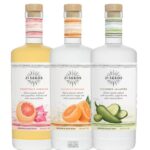I got the opportunity to participate in some focus groups for a beverage startup who was trying to understand brand engagement. They wanted to plumb why consumers choose certain beverages differently based on occasion? Why do they pick a particular type or beverage brand in the morning versus mid-day versus the afternoon or evening?
They hoped to unlock how to communicate a motivating message to their target audience if they understood what drives someone to buy and when they buy too.
The research was a one-on-one interview, not a dozen people commenting at the same time. The moderator could poke and prod for more information to try and uncover the story in the consumer’s head. She would ask open-ended questions that the consumer had to complete.
- I drink sparkling water late at night because…
- I drink beverages with alcohol during the day because…
- I drink coffee-based products in the afternoon because…
- I drink flavored water before work because…
What I learned was unexpected yet reflected how I behave too.
The consumer had constructed an elaborate story that she told about why she behaved a certain way. The record or journal she provided of what she bought in the last month, was different from her reported behavior.
For example, her story was her justification for why she allowed herself to have high-sugar beverages even though she told herself a story of wellness and healthy drink consumption.
What she said was different from what she did. But, she constructed stories to help rationalize the actions and to help her justify her disconnection.
The research subject’s language and description surprised me because the woman behind the glass wall described a frame of reference that wasn’t something I even thought about when considering how to communicate with her.
She told stories that didn’t make sense with how she acted.
It was as if she was saying, “here is how I give myself permission to do something I know isn’t good for me, but my story helps me justify my actions.”
As an example, the consumer told us that she didn’t eat breakfast, so she gave herself permission to drink a 400 calories coffee-based drink because she had a busy day and needed to focus. She explained this as a healthy alternative to a traditional breakfast. That was the story she told herself to justify her behavior.
What Consumers Say Versus What They Do
As consumers, we don’t buy products or services only for functional or even rational reasons. I don’t pick one out of 200 beverage choices at a store just because I’m thirsty; there is often a reason that goes deeper. It may reflect my values, my social status or some convoluted emotional state. I pick something because of how it makes me feel and a belief that people like me drink beverages like this type of product at this time of day. People say they buy a certain brand or category for a reason, but they justify it with a story in their head.
Imagine pulling up to a traffic light. Two cars are side by side, a Hummer and a Prius. You can only imagine the stories each person tells themselves of why they drive that brand of car and what story they tell about the other person in those other cars.
We make most purchased based on emotional, social and irrational needs, not the practical or visible. We tell ourselves stories that we want to believe, but the rationale is often much more complicated.
For the last fifteen years, I believed that people like me should drive a Lexus. I thought that people like me should shop at Whole Foods. I assumed that people like me should drink wine that comes from grapes that are uncommon to many people like Viognier or Chenin Blanc or Nebbiolo. I also believe that people like me should wear Happy Socks not dull and boring socks. I explain my behavior to myself as intentional, but I know it is way more irrational.
Choice is Complicated
As consumers, we act, we buy, we do things and think we are rational. In fact, we behave and purchase stuff for complicated emotional reasons that we try and explain to ourselves or others. We construct stories in our head. So, although I’m careful in how I spend money, I rationalize a need to buy or use or wear specific brands that aren’t the least expensive option.
Why am I so passionate about Dyson vacuum cleaners? How do I explain my strong preference for Starbucks versus Dunkin Donuts coffee? How come I say I want to support local bookstores but the ease and convenience of Amazon are just too enticing, so I rarely shop locally.
If you are trying to market your brand, product or service to consumers or other businesses, what are the stories in their heads they tell themselves about people who buy those things? We all have stories in our heads that we believe are true.
What is the story your prospective customer tells themselves about your category or brand?
Trying to understanding the mysteries of marketing? You can set up a time to chat using my calendar. Email me jeffslater@themarketingsage.com Call me. 919 720 0995. The conversation is free and we can explore if working together makes sense. Try my new chat feature on my site if you have a quick question.
Photo by Jony Ariadi on Unsplash




